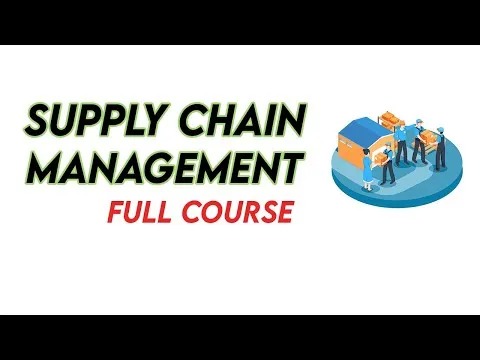
Supply Chain Optimization 
This course provides an overview of supply chain optimization, including components of optimization, capacity and resource optimization, and Monte Carlo simulations. Participants will gain hands-on experience in setting up optimization problems in Excel and using simulations to make the least risky decisions in uncertain supply chain situations. ▼
ADVERTISEMENT
Course Feature
![]() Cost:
Cost:
Free
![]() Provider:
Provider:
Coursera
![]() Certificate:
Certificate:
Paid Certification
![]() Language:
Language:
English
![]() Start Date:
Start Date:
22nd May, 2023
Course Overview
❗The content presented here is sourced directly from Coursera platform. For comprehensive course details, including enrollment information, simply click on the 'Go to class' link on our website.
Updated in [March 06th, 2023]
1. You will gain an understanding of the components of optimization and how to set up an optimization problem in Excel.
2. You will learn how to practice capacity and resource optimization and explore examples of both in the supply chain.
3. You will be able to use a Monte Carlo simulation to make the least risky decision in uncertain supply chain situations.
4. You will be able to combine your skills from this and the previous two courses to build a demand and inventory snapshot and optimize it, using a Monte Carlo simulation, to mitigate risks in the supply chain.
[Applications]
After this course, students can apply their knowledge of supply chain optimization to their own businesses. They can use the Excel optimization techniques to set up and solve optimization problems, and use Monte Carlo simulations to make the least risky decisions in uncertain supply chain situations. Additionally, students can use the skills they have learned to build a demand and inventory snapshot and optimize it, using a Monte Carlo simulation, to mitigate risks in the supply chain.
[Career Paths]
Job Position Paths:
1. Supply Chain Analyst: Supply chain analysts are responsible for analyzing data and making recommendations to improve the efficiency of the supply chain. They use optimization techniques to identify areas of improvement and develop strategies to reduce costs and increase efficiency. They also use Monte Carlo simulations to assess the risk of different supply chain decisions.
2. Supply Chain Manager: Supply chain managers are responsible for overseeing the entire supply chain process. They use optimization techniques to identify areas of improvement and develop strategies to reduce costs and increase efficiency. They also use Monte Carlo simulations to assess the risk of different supply chain decisions. They are also responsible for managing the supply chain team and ensuring that the supply chain is running smoothly.
3. Supply Chain Consultant: Supply chain consultants are responsible for providing advice and guidance to companies on how to improve their supply chain processes. They use optimization techniques to identify areas of improvement and develop strategies to reduce costs and increase efficiency. They also use Monte Carlo simulations to assess the risk of different supply chain decisions.
Developing Trends:
1. Automation: Automation is becoming increasingly important in the supply chain. Automation can help reduce costs and increase efficiency by streamlining processes and eliminating manual labor.
2. Big Data: Big data is becoming increasingly important in the supply chain. Big data can help supply chain managers make better decisions by providing them with more accurate and up-to-date information.
3. Artificial Intelligence: Artificial intelligence is becoming increasingly important in the supply chain. AI can help supply chain managers make better decisions by providing them with more accurate and up-to-date information. AI can also help automate processes and reduce costs.
[Education Paths]
1. Bachelor of Science in Supply Chain Management: This degree program focuses on the management of the supply chain, from procurement to delivery. Students learn about the principles of supply chain management, including inventory management, logistics, and customer service. They also learn about the latest technologies and trends in the industry, such as artificial intelligence, blockchain, and big data.
2. Master of Science in Supply Chain Analytics: This degree program focuses on the use of data and analytics to optimize the supply chain. Students learn about data mining, predictive analytics, and optimization techniques. They also learn about the latest technologies and trends in the industry, such as machine learning, artificial intelligence, and blockchain.
3. Master of Business Administration in Supply Chain Management: This degree program focuses on the business aspects of supply chain management. Students learn about the principles of supply chain management, including inventory management, logistics, and customer service. They also learn about the latest technologies and trends in the industry, such as artificial intelligence, blockchain, and big data.
4. Doctor of Philosophy in Supply Chain Management: This degree program focuses on the research aspects of supply chain management. Students learn about the principles of supply chain management, including inventory management, logistics, and customer service. They also learn about the latest technologies and trends in the industry, such as artificial intelligence, blockchain, and big data. They also conduct research on topics such as supply chain optimization, risk management, and sustainability.
Pros & Cons

Comprehensive coverage of easier topics

Detailed explanations of simpler concepts

Inadequate explanations of complex topics

Unnecessary details for easier subjects
Course Provider

Provider Coursera's Stats at AZClass
Discussion and Reviews
0.0 (Based on 0 reviews)
Explore Similar Online Courses

American Literature

Learn The Guitar By Learning Songs - LEVEL 1

Python for Informatics: Exploring Information

Social Network Analysis

Introduction to Systematic Review and Meta-Analysis

The Analytics Edge

DCO042 - Python For Informatics

Causal Diagrams: Draw Your Assumptions Before Your Conclusions

Whole genome sequencing of bacterial genomes - tools and applications

MIT Free Supply Chain Management Courses

What Are Good Supply Chain Certifications?

Supply Chain Management (Full Course) SCM Lecture
 Related Categories
Related Categories
Quiz
 Submitted Sucessfully
Submitted Sucessfully
1. What is the purpose of a Monte Carlo simulation?
2. What is the first step in setting up an optimization problem in Excel?
3. What is the purpose of capacity optimization?
4. Which of the following is NOT a component of optimization?
5. What is Monte Carlo simulation?
Correct Answer: It is a mathematical technique used to make decisions in uncertain situations.
6. What is the purpose of capacity and resource optimization?


Start your review of Supply Chain Optimization